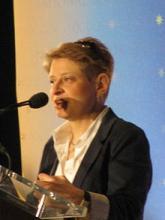Behind the scenes at piano competitions
Has the time come to rethink the concept of piano competitions? Many participants and leading musicians believe so. The proliferation of international competitions - now numbering more than 750 - is producing hundreds of annual laureates who face increasing difficulties finding venues to perform.
Many are forced to change careers or resort to pedagogy despite their honors, their dedication and their evident talent.
As the audiences for live piano recitals shrink, this flood of new players must scramble harder to be noticed. Simply put, competitions, according to some ex-participants, can be a colossal a waste of time in the quest for success. "The idea that a competition success will bring long-term career is an urban legend" says Ivan Ilic, a rising young American pianist based in France. "You lose time in competitions and you can't catch up."
French pianist François Frédérique Guy believes the competition world is too large for its own good. "In my opinion, winning doesn't help much in the long term because of this inflation of competitions."
Worse, pianists and teachers say that young artists who concentrate on competitions can suffer from the rigid imprint of competition pianistic style, narrowing of repertoire and - for the losers - lasting psychological damage.
Says Italian pianist Roberto Prosseda, "My great luck was to not win first prize in a major competitor. I was forced to find alternative ways to become known, such as searching for my own personal musical approach." Prosseda has made a name for himself researching Mendelssohn piano repertoire and producing CDs of these rare works.
Adds Guy: "The danger of competition is that the competitor compromises his style of playing to satisfy the taste of the jurors. Of course that's the wrong approach."
After several weeks of research and interviews with a broad spectrum of personalities in the competition world, I can say a consensus is forming for competitions to impose more rigor in their organizational processes, particularly jury management.
The most striking evidence of this is the growing sense of anger among young pianists. A petition circulating on the internet (click here to read) exemplifies this resentment.
More than 500 respondents, mostly career pianists, have signed the petition demanding "transparency" in jury voting procedures and reform of the competition process.
A companion survey asks the hard questions about jury composition and ethics, including this:
"Do you find it problematic that many jury members are also active teachers and that their students often participate in the competitions they judge?" Partial results obtained for this article indicate 77 percent have responded "Yes."
The questionnaire also invites respondents to name jurors they would least like to perform for. Karl-Heinz Kammerling of Hannover and Salzburg ranks first at 79 percent for his perceived lack of impartiality. Among the top 15 are such leading piano personalities as Leeds Competition founder Fanny Waterman and Juilliard head of piano Yoheved Kaplinski.
At the center of the competition controversy is the selection and behavior of jurors, largely a closed club of piano teachers who dominate and ultimately control the major competitions. The Alink-Argerich Foundation in the Hague, The Netherlands, monitors the judging world and has a ranking of the most active jurors. Italian teacher Vincenzo Balzani is at the top, having judged 63 competitions in the past 10 years. Fellow Italian Sergio Perticaroli is second at 62, and Polish pianist Piotr Paleczny is third at 51.
Teachers flock to the competition world for the prestige, the power and the opportunity to find new students - sometimes those they have voted down. Jurors are treated as royalty at most competitions, housed in fine hotels, wined and dined in the evenings, and some receive handsome honorariums.
Some run their own competitions and promote them openly while serving as jurors. Many pianists believe that a basic weakness of the judging tradition is the dominance of teachers on the juries, bringing the "teacher mentality" into the competition world.
Latvian-born Dina Yoffe, a laureate of the Chopin and Schuman competitions, wrote in Piano News that today the "ever-present jurors" easily attract new students who have won important prizes. "This is how so-called 'boutique studios' are born, to which only prizewinners belong. Many of these winners do of course need to continue studying, but why only within this same small group of professor-jurors?" Yoffe asked.
It has become commonplace among critics of competitions to say that a creative artist such as Vladimir Horowitz or Ignaz Friedman would not survive the first round of a major competition today. French pianist Guy has performed at several competitions and explains it in these terms: "The jurors are the people who 'know'. They have a kind of musical code and if you are not connected to this code, you have no chance."
New York pianist and music writer Charles Rosen told me recently that he too has problems with the teacher mentality. "Teachers don't like to hear an interpretation that is different from the way they teach a piece," he said. "Composers and conductors on a jury will almost always be more open."
Adds Fou Ts'ong, the London-based pianist of Chinese origin, "There are too many professional jurors. The competitions are controlled by the same people. It has become too professional. It's a career for them, an exchange club. Many of them run their own competitions. It has become an industry."
Some professionals believe the question of jury bias - trading votes, bullying colleagues, promoting one's own students - could be brought under control with more rigor in jury procedures. Eugene Pridonoff, professor of piano at the University of Cincinnati, College-Conservatory of Music, believes judges should sit apart from each other to avoid subtle or open influence on the result.
"Playing should be judged on an absolute sense without knowledge of age, teachers, and previous competition experience," he told me in a recent exchange of emails. "During the competition, the judges should be separated from each other by curtains so that any conversation, body language, and all possible forms of subtle persuasion are eliminated."
Pridonoff imagines the day when voting could be immediate, as in the Olympics, and publicly displayed on a screen so that everyone can see each vote of each judge. "This would not necessarily assure a foolproof system, but it could minimize improper and inappropriate influences that are plaguing many of the world's music competitions today," he said.
In practice, however, jurors are likely to remain unmanageable. They will always whisper their preferences with a wink and a nod to each other. They are commonly acquainted from previous competition work, and they socialize outside the concert hall. This environment is de facto impossible to moderate.
Rosen wrote in his recent book "Piano Notes" that total objectivity of jurors is a vain hope. "You can sense the disapproval or enthusiasm of the colleagues sitting next to you by the way they squirm or breathe ecstatically or by how emphatically thy write large "NO!" in capital letters next to a candidate's name. In any case, discussion will always take place."
Pianist Guy despairs of the trends that have skewed competitions. He says competitions have become a reflection of society in general -- "fast, brilliant, media-friendly, superficial. And what survives all this? Nothing. Sometimes music is not the winner."
Competitions have suffered from a rash of embarrassing recent incidents, reflecting the intense rivalry among players and dramatizing the desperately high stakes involved.
Even the jurors have found themselves in trouble. They were publicly castigated at the recent Geza Anda competition in Zurich when the president, Hortense Anda-Buhrle, widow of the renowned pianist Geza Anda, took the unprecedented step of disavowing their selections after the first round on the grounds that they were favoring players with the fastest fingers and loudest styles. She stopped short of overruling the jurors, however, in the belief that jury decisions must be final.
The most dramatic events have swirled around Veda Kaplinski, head of piano at New York's Juilliard School. At the Van Cliburn International Competition in Fort Worth, Texas, in June, she was criticized for helping shepherd 12 performers with whom she has direct or indirect relationships into the competition in her capacity as chair of the pre-selection committee. In the previous Cliburn competition, she managed to bring seven of her eight students to Fort Worth.
Young competition players have nicknamed her "Darth Veda".
Although she escaped outright death threats this year, she had moments of anxiety at the previous Cliburn competition four years ago, prompting her to call the Fort Worth Police twice.
Mme. Kaplinsky was the object of a "smear campaign", according to the Forth Worth Star-Telegram newspaper, that included harassing email messages, an anonymous letter, internet postings and late-night phone calls.
The personal attacks had began earlier that year at the Rubenstein Competition in Tel Aviv when she received an anonymous threatening letter.
The newspaper reported that one email arrived at the Cliburn from the address youareadeadwoman@hotmail.com. "How can you sleep at night?" asked the unsigned message. "If I were you, I'd be concerned." About six times during her stay in Fort Worth, Mme. Kaplinsky said, she received late-night telephone calls in her hotel room and heard only heavy breathing at the other end.
I emailed a query to the "youareadeadwoman" address asking the anonymous complainer to elaborate. My email bounced. Other sources report that the threats have been traced to a disgruntled pianist, possibly a former Kaplinsky student.
Mme. Kaplinski said four years ago she would have to think hard about returning to the Cliburn but outgoing Cliburn President Richard Rodzinski persuaded her to return this year. Other observers have noted that merely staying away from competitions in which her students appear would solve the problem.
The Cliburn faced additional controversy in June, however, over the award of a joint first prize to Chinese teenager Hoachen Zhang and blind Japanese pianist Noboyuki Tsujii. Many professionals at the competition felt the jury had unfairly undervalued more talented players. A major article in the Wall Street Journal by respected arts commentator Benjamin Ivry was uncompromising. "What was the jury thinking?" the headline asked.
He branded Tsujii as a pianist "plainly out of his depth". Tsujii's reading of Rachmaninoff Piano Concert No. 2 was "a disaster" Ivry wrote. And he characterized competitions in general as a "frenzy for attention in an ever-narrowing market".
A series of high-level resignations followed the competition, including President Rodzinski after 23 years with the organization. Sources close to the competition say he was asked to depart. Also leaving abruptly were general manager Maria Guralnik and Sevan Melikyan, director of marketing and public relations. Mme. Guralnik said in an email exchange with me that she was moving at her own volition to the piano department of the State University of New York, at Purchase.
The controversies at the Cliburn continue to raise concerns in the piano world. The head of one leading piano school told me, "No one will touch the Cliburn now. It's radioactive."
Perhaps as Charles Rosen says it is a vain hope to believe that bias can be removed from competitions. There is scope for more objectivity, however, and a young generation of pianists can only benefit from seeing this happen.
Gustav Alink, president of the Alink-Argerich Foundation, is philosophical about some of the flaws in the competition world.
"It is remarkable to see how emotional people can be at competitions," he told me recently, "especially about the results. Even the jury members themselves! When hearing some of them talk, it is difficult to believe that their judgment is impartial.
"But then, there is no such thing as objectivity in music. Thank God for that. Music is art, and every judgment on art is bound to be subjective -- except when one chooses to consider purely the technical aspects of a performance."
Read also related article by Michael Johnson: "Odd couple share Cliburn gold".
This article is brought to you by the author who owns the copyright to the text.
Should you want to support the author’s creative work you can use the PayPal “Donate” button below.
Your donation is a transaction between you and the author. The proceeds go directly to the author’s PayPal account in full less PayPal’s commission.
Facts & Arts neither receives information about you, nor of your donation, nor does Facts & Arts receive a commission.
Facts & Arts does not pay the author, nor takes paid by the author, for the posting of the author's material on Facts & Arts. Facts & Arts finances its operations by selling advertising space.





















